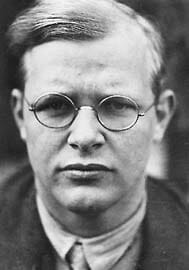
The subject of this film—Dietrich Bonhoeffer (1906-45), the pacifistic German theologian who nevertheless conspired to assassinate Hitler and was martyred for it—is so great that he bursts through the boringly competent PBS style of the film itself. Voice-over narration, old photos, interviews, classical music: director Martin Doblmeier uses all the tricks of the tony, standard-issue TV bio to tell Bonhoeffer’s story with a frumpy, old professor seriousness. But the story itself ranks with those of Gandhi, King, Archbishop Romero or Dorothy Day (or, more recently, Rachel Corrie) in its power to—excuse the word—inspire. It’s the sort of story that makes words like “inspire” (or “heroes”) necessary in the first place; it explodes our crafted irony, our moral paralysis and indecision.
As the film relates, Bonhoeffer surprised his cultured, liberal parents by choosing to study theology, earning his Ph.D. at the astounding age of 21. Afterward he studied in New York, while spending his Sundays at the Abyssinian Baptist Gospel Church—an institution known to roots music fans for its choir’s classic 1960 album, Shakin’ the Rafters, but useful to Bonhoeffer primarily for its example of a people emotionally, unreservedly devoted to their God. On his return to Germany, he accepted a teaching position at the University of Berlin. What would have been a brilliant academic career coincided with the rise of Hitler.
Had Bonhoeffer remained simply an ideological foe of Nazism—as during most of the ’30s he led German Christians to form an anti-Nazi splinter group, called Hitler an “idolater,” and taught in a seminary the German government later declared illegal—he would still deserve credit for keeping hold of his conscience when so many about him were losing theirs. And indeed, Doblmeier’s film is nowhere more poignant than in its portrait of Bonhoeffer the pastor, friend and colleague—the man who, we learn, took time out from his central role in the religious resistance to Hitler to bring chocolates to his friend and future biographer Eberhard Bethge. But the radical brutality of post-Krystallnacht Germany radicalized him; he joined with resistance efforts to free Jews. And the staunch pacifist, who had written his classic Cost of Discipleship (1936) partially to argue that Christians should literally obey Jesus’ injunctions to “turn the other cheek” against violence, aided a military intelligence officers’ plot to kill Hitler.
Nothing about this film separates it stylistically from the well made, but run-of-the-mill TV biography. What it does have is a great story, told through excellent interviews—particularly with Bethge and South African Archbishop Desmond Tutu (who knows a thing or two about the cost of discipleship). The film unfortunately glosses over Bonhoeffer’s involvement in the “Operation 7” plan to hide and relocate Jews. Caveats aside, however, there may be more life in this humbly made little documentary than in anything else that hits the screen this year; if nothing else, it reminds the viewer that even high-minded aristocratic intellectuals can be martyrs—and heroes.